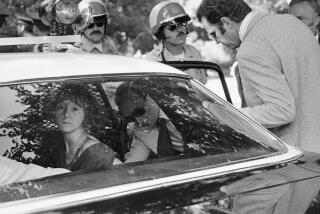Evidence in Spying Case Paints Picture of Radical Zeal
WASHINGTON — A small woman with large round glasses, she was giddy the day the Christmas card arrived in the mail. “I cried and cried and cried,” she reportedly said.
The card was from a senior Communist leader in South Africa and it would lead the well-placed Pentagon attorney and mother of two, who ferried her children around the nation’s capital in the family’s old blue Plymouth van, into the arms of the government she worked for but detested.
Theresa Marie Squillacote, 39, and her husband, Kurt Alan Stand, 42, are communists--there is no denying that. The FBI also says that they are spies. Together with a close friend, 49-year-old James Clark, they now stand accused in the latest espionage scandal to rock Washington.
According to federal court files, the three--onetime student radicals--willingly hired themselves out to the East German intelligence unit years ago. Later, their revolutionary zeal still afire, they sought to sell their snooping talents elsewhere--to Russia and Marxists in South Africa, the FBI alleges.
All three were arrested last weekend in a government sting operation.
Court-appointed lawyers for Clark and Squillacote declined to comment Tuesday.
Terry Radtke, a law student who describes his politics as right-of-center but says he espoused leftist ideology when he knew the accused spies two decades ago at the University of Wisconsin at Milwaukee, said Tuesday that they are the epitome of the phrase “the old left never dies.”
“Were they true believers? Yes,” he said.
Recalling the 1980 outdoor wedding in Milwaukee of Squillacote and Stand, he added: “They were very much in love.”
According to friends from their student days, Stand said he is the son of a German-born member of the Communist Party. Squillacote is the daughter of a lawyer for the National Labor Relations Board in Milwaukee.
Bruce Fetter, a history professor at the Milwaukee campus, was Squillacote’s faculty advisor in 1976. He recalls her as “a solid A-minus student.”
She was, he added, a “nice bourgeois lefty.”
According to the FBI, Stand recruited his wife and Clark into spying for East Germany.
The affidavit, filed Monday after their arrests, charged them with spying for that country’s intelligence service after Stand signaled his interest in espionage in 1972. The government alleges that--in their first years as agents, with Stand working for a series of labor unions and Squillacote for her father’s employer, the NLRB--they began gaining access to classified U.S. documents and passing them to their East German handlers.
The FBI said that, along with Clark, they sent photographs and other materials inside secret compartments in books, sewn into leather jackets and hidden in girls’ dolls. It was ideology, not greed, that drove them, the FBI said, although they were paid $40,000 during one four-year period and often had their expenses paid.
Stand and Squillacote lived modestly in the northeast section of Washington, sharing with their two young children, Karl and Rosa, a two-level Cape Cod-style home.
During the 1980s and into the 1990s, Clark worked as an Army paralegal and with a defense contractor at the Rocky Mountain Arsenal in Colorado. He allegedly passed on secret materials on how to manufacture the neve gas Sarin. He later worked as a private investigator in the Virginia suburbs.
Stand continued working for labor unions while Squillacote rose through the ranks of government. She obtained a job on the House Armed Services Committee through her father’s connections with the late Rep. Les Aspin (D-Wis.), who then chaired the panel and later served as President Clinton’s first Defense secretary. In 1991, Squillacote came to the Pentagon under the sponsorship of former Deputy Undersecretary of Defense Colleen E. Preston, who had worked with her on the armed services panel.
At the Pentagon, where Squillacote worked as a lawyer until last January, she won one of the Hammer Awards given by Vice President Al Gore to bureaucrats who help “reinvent” government.
With the fall of the Berlin Wall in late 1990, the reunification of Germany and the end of the Cold War, the undercover activities of the three hit a lull, the FBI contends. But the agency alleges that Squillacote, in particular, was eager to begin spying again.
After having no luck making contacts with Russian handlers, she allegedly sent a letter to an official in the South African Communist Party in 1995, offering her services. She described herself as a Marxist and deplored “spiritual death” in America.
Later that year, she received the Christmas card, and that is when she was said to rejoice that she had made contact again. But the FBI also had learned of her outreach and in 1996 federal agents started a sting operation in which they posed as South African intelligence officials and sought her cooperation.
From the moment of her first meetings with them, she seemed eager to please, according to the FBI. She allegedly boasted that they spoke in code and used secret names (she was “the swan”). She allegedly passed to them a series of classified documents from the Pentagon and other sources. In the end, she even cooperated when she was arrested.
“That was what was so surprising,” said Thomas J. Pickard, assistant director of the FBI field office. “She started talking right away.”
More to Read
Sign up for Essential California
The most important California stories and recommendations in your inbox every morning.
You may occasionally receive promotional content from the Los Angeles Times.












